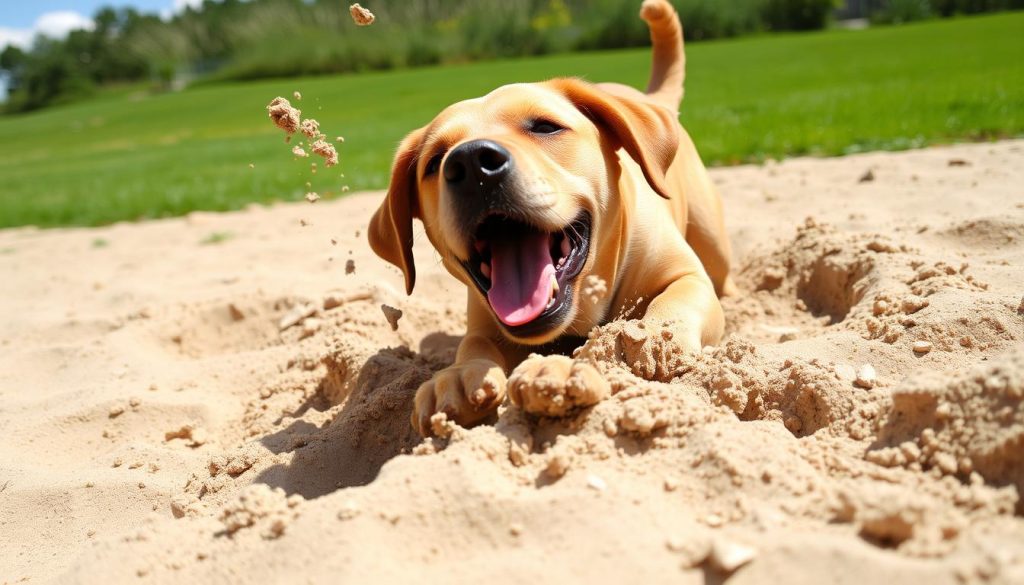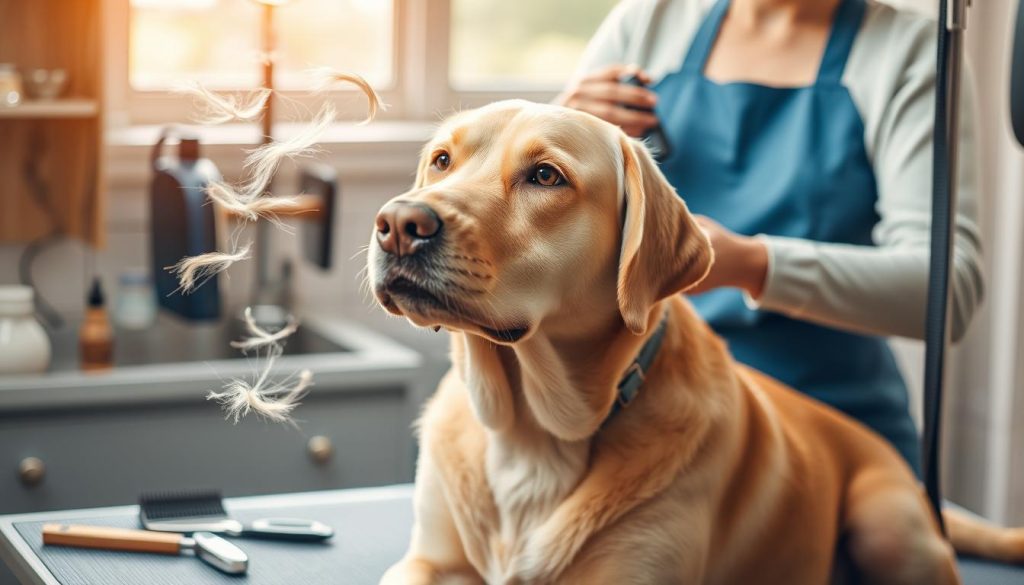Do Labrador Retrievers Like to Dig? | Lab Behavior
Did you know Labrador Retrievers, a top dog breed, love to dig1? They dig with great enthusiasm, even tunnelling under fences1. This makes many owners ask, “Do Labrador Retrievers like to dig?”
Labrador Retrievers are great family pets, known for being friendly and loyal2. They are smart and full of energy, growing to be quite big2. But, their love for digging can sometimes be a problem.
Key Takeaways
- Labrador Retrievers are renowned for their enthusiastic digging habits, often tunnelling under fences and excavating with zeal.
- Labs may dig to leave a scent mark, get rid of pent-up energy, or due to boredom, frustration, anxiety, or loneliness.
- Labradors have extra-sensitive noses and a natural hunting instinct, contributing to their digging behaviour.
- Providing sufficient exercise and mental stimulation, as well as creating a designated digging area, can help manage and prevent destructive digging.
- Addressing the underlying causes of digging is key to whether a Labrador puppy will grow out of this behaviour.
The Labrador Retriever: A Beloved Family Companion
The Labrador Retriever is a top dog breed in the UK. It’s known for being friendly, good-natured, and loyal3. They love being part of an active family, enjoying lots of exercise and play4. Their outgoing and eager-to-please nature makes them easy to train and bond with.
Friendly Temperament and Loyal Nature
Labrador Retrievers are known for their gentle and affectionate nature3. They are patient and great with kids, which is why they’re a hit with families4. Their loyalty and devotion to their owners are unmatched, as they sense their human’s needs and emotions.
Ideal for Active Households
Labrador Retrievers are full of energy and love to play3. They need lots of exercise and mental games, like swimming and training, to stay happy and healthy4. Their eagerness to please means they fit into many activities, from outdoor fun to indoor training.
“Labradors are the perfect blend of enthusiasm, intelligence, and affection, making them beloved companions for active families.”
The Labrador Retriever’s friendly, loyal, and active nature makes them a favorite in the UK. They’re a popular choice for many families.
Do Labrador Retrievers Like to Dig?
Labrador Retrievers are great family pets, but their digging can be a problem. They dig for reasons like boredom, not enough exercise, and their hunting instincts5. Dogs naturally dig, and it’s hard to stop them if they like it5.
Digging is fun for Labradors because they like the feeling of digging and finding new smells or small animals5. Wild dogs dig dens for shelter, and6 digging is a natural behaviour for dogs, like barking and sniffing6.
6Some dog breeds, like terriers, were bred to dig because they hunted underground6. Labradors, bred for hunting, also tend to dig. Knowing why they dig helps manage this behaviour.
| Reasons for Labrador Digging | Strategies to Manage Digging |
|---|---|
Understanding why Labradors dig and using the right strategies can help. This way, owners can keep a good relationship with their dogs.
“Digging can become a self-rewarding behaviour, as Labs enjoy the physical and sensory experience of digging, as well as the potential discovery of interesting scents or small prey underground.”
Reasons Behind Labrador Digging Behaviour
Labradors are loved for their friendly nature and loyalty. But, their high energy and instincts can lead to digging. Knowing why they dig is crucial to stop it7.
Boredom and Lack of Exercise
Labradors need lots of exercise and mental stimulation. Without it, they might dig to release energy and fight boredom7.
Instinctual Hunting Behaviour
Digging is linked to Labradors’ hunting instincts. They were bred to retrieve waterfowl. This instinct can make them dig, searching for small prey or scents8.
Some breeds, like Terriers, are more likely to dig. Dogs may also dig due to comfort, boredom, or stress. This shows there are many reasons for digging7.
Having a sandpit for dogs to dig in can help. It keeps digging in one place. Activities like snuffle mats or deconstruction boxes also keep them busy7.
Teaching dogs commands like ‘recall’ and ‘drop it’ can also help. It shows training can manage digging7.
“Understanding the reasons behind a Labrador’s digging behaviour is the first step in developing effective strategies to manage and prevent this common issue.”
Managing and Preventing Destructive Digging
Stopping a Labrador from digging needs a few steps. First, make sure they get enough exercise and mental play. A happy, active Labrador is less likely to dig out of boredom9. Give them fun toys, games, and activities like swimming or hiking to keep them busy10.
Providing Sufficient Exercise and Mental Stimulation
Labradors might dig because they have a strong prey drive11. Some dig for fun, especially young Labradors11. Stress from new situations or changes can also make them dig more11. Proper exercise and mental games can help control this digging10.
Creating a Designated Digging Area
Also, setting up a special digging spot, like a sandbox, helps. It lets them dig naturally without harming the yard11. Pregnant dogs might dig to make a nest for their puppies. A safe area can stop them from digging where they shouldn’t11. Rewarding them with treats and praise teaches them what’s good10.
By meeting their physical and mental needs and giving them a digging spot, owners can stop Labrador digging. This approach tackles the problem effectively91110.

| Reason for Digging | Recommended Solution |
|---|---|
| Boredom and lack of exercise | Increase physical and mental stimulation |
| Instinctual hunting behaviour | Create a designated digging area |
| Stress or anxiety | Address underlying causes, provide a calming environment |
| Nesting behaviour in pregnant females | Provide a suitable nesting area |
| Escape or prey drive | Improve fencing, increase supervision, redirect behaviour |
“Proper exercise and mental engagement can effectively manage the digging problem in Labradors.”
Training Your Labrador Not to Dig
Stopping a Labrador from digging needs a mix of managing their environment and training. Using positive methods is key to teaching them good habits and changing their digging urge12.
Keeping your Labrador active with activities like running, swimming, or hiking can stop boredom digging12. Giving them lots of toys and chew items, like Elk Antlers or beef leg bones, keeps them busy and healthy12.
Setting up a special digging area or using things like rocks or chicken wire can also help1213. Regular training and understanding why they dig are crucial to stop them from digging where they shouldn’t.
If you need more help, taking a basic training class or getting advice from a dog trainer or behaviourist is a good idea12. They can give you tips that fit your Labrador’s needs, helping you teach them and keep them from digging.
“With patience, persistence, and positive reinforcement, you can effectively train your Labrador to curb their digging tendencies and enjoy a well-behaved, thriving companion.”
Outdoor Enrichment for Labradors
It’s vital to give Labradors lots of chances to play outside. They need toys and games that keep them active and sharp. These dogs love to move and solve problems.
Interactive Toys and Games
Try puzzles or balls that make them work for treats14. Dogs enjoy earning their food, which boosts their brain power14. Sniffing games or food scatters are like 50 minutes of exercise for their minds14.
Games like fetch or tug-of-war are great for their energy14. Snuffle mats and treat balls keep them busy for hours14. Kong toys are also good for their minds, filled with treats14.
Offering many toys and games keeps your Labrador happy and healthy. It stops them from getting bored and digging. This way, they stay active and sharp.
Labrador Breed Characteristics
The Labrador Retriever is a favourite family pet known for its endless energy and friendly nature15. They come from England and were bred from the St. John’s Water Dogs of Newfoundland, Canada. Labradors are famous for their great hunting and retrieving skills15.
Energy Levels and Exercise Requirements
Labradors are very active and need lots of exercise to stay happy16. They need at least an hour of active play each day, like walks, jogs, swimming, or playtime16. This helps prevent boredom and bad behaviour16.
Their endless energy comes from being a working breed15. Originally, they helped hunters by fetching waterfowl and other game15. This background makes them perfect for families who love to stay active15.
It’s important for owners to give Labradors lots of physical and mental challenges16. If they don’t get enough exercise, they might start chewing, digging, or causing trouble16. Spending time and effort on their exercise needs will make them a happy and well-behaved pet15.
Grooming and Shedding in Labradors
Labrador Retrievers are friendly and loyal, making great family pets. But, they shed a lot because of their short, dense coats17. They live for 10 to 12 years17 and shed more during two main seasons18.
Labradors come in black, yellow, and chocolate (brown) colours17. But, their shedding doesn’t change much with colour18. It’s important to groom them regularly and use deshedding tools to manage their hair loss18.
- Weekly brushing with a slicker or pin brush is recommended to remove loose hair18.
- Thorough grooming with a deshedding tool a few times a year can help remove the Labrador’s thick undercoat18.
- Vacuuming and lint rolling are also necessary to keep up with the shedding18.
Shedding is natural for Labradors18. Regular grooming and special tools can reduce hair around the house18. Owners need to spend time grooming their Labrador to keep their coat and shedding in check18.

Labradors can also get health issues like hip and elbow dysplasia, eye problems, and obesity17. Keeping them healthy with a balanced diet and enough exercise is key17.
| Labrador Retriever Statistics | Value |
|---|---|
| Lifespan | 10 to 12 years17 |
| Coat Colours | Black, Yellow, Chocolate (Brown)17 |
| Prone Health Issues | Hip/Elbow Dysplasia, Eye Problems, Obesity17 |
| Feeding Recommendations | Healthy, Balanced Meals, 2-4 Times per Day17 |
| Average Running Speed | 20 to 30 Miles per Hour17 |
| Barking Tendencies | Moderate, Not Excessive17 |
Labrador owners must commit to grooming and shedding management for a happy dog. Knowing the breed’s traits and grooming practices helps keep the dog and home fur-free18.
Common Health Concerns in Labrador Retrievers
Labrador Retrievers are known for their friendly nature and love for activity. They are generally healthy but can face certain health issues19. These include hip and elbow dysplasia, and a higher risk of cancers and heart diseases. They are also at risk of bloat, a serious condition that needs quick vet care19.
On average, a Labrador lives for 10 to 12 years. With proper care, some can even reach 12 or 13 years old19. It’s important to breed responsibly and get regular vet check-ups to keep them healthy.
Labradors can face genetic disorders like Tricuspid Valve Dysplasia and Hip Dysplasia19. A good diet is key to preventing some of these conditions19.
- Labradors need 1 to 2 hours of exercise daily, with a mix of activities20.
- They love retrieving games, water activities, and interactive toys20.
- Signs they need more exercise include weight gain and hyperactivity20.
- Consistent routines and socialisation with other dogs are important20.
Socialisation is crucial for Labradors. They need to interact with people and dogs to develop well20. Exposure to different environments and sounds helps them grow up well-rounded20.
Grooming is also key. They need weekly brushing and a bath every 2-3 months20. Trimming their nails every 3-4 weeks is also important20.
“Responsible breeding practices and regular veterinary check-ups are crucial for maintaining the Labrador’s overall wellbeing.”
Finding the Right Labrador for Your Family
Adding a Labrador Retriever to your family needs careful thought. Look for breeders who focus on the health and temperament of their dogs. They can help you choose a puppy that fits your lifestyle21. Or, consider adopting from a rescue to meet adult dogs and see their personalities22. The right Labrador is key to a happy home.
Reputable Breeders and Rescue Organisations
Choosing a Labrador breeder who cares about the breed’s health is vital. Good breeders raise puppies in a loving home and socialize them early21. Adopting from a rescue lets you meet dogs and find the best match for your family22.
When Adopt Labrador Retriever or Find Labrador Retriever breeder, research and ask questions. Reputable sources will share the dog’s health, temperament, and history. This helps you make a choice that will bring joy to your home2122.
Choosing the right Labrador can bring great happiness to your family. Whether you Adopt Labrador Retriever or Find Labrador Retriever breeder, your effort will pay off. You’ll welcome a wonderful furry friend into your life2122.
“A Labrador Retriever is not just a dog, but a lifelong companion that can enrich your family’s life in countless ways.”
Conclusion
The Labrador Retriever is a favourite family pet. It is known for being friendly, loyal, and full of energy. Labrador Retrievers are big dogs, with males being taller and heavier than females. They live for 10 to 12 years, with some living longer with good care23.
While they are great for active families, they can dig a lot. This digging is often due to boredom, not enough exercise, or their hunting instincts. Labs need 30 to 60 minutes of exercise every day to stay happy24.
By giving them enough to do and places to dig, you can stop them from digging in unwanted places. With the right care, a Labrador Retriever can bring joy to any family. They offer a lot of love and companionship, making them a great choice for many families.
FAQ
Do Labrador Retrievers like to dig?
Yes, many Labrador Retrievers like to dig. This can be frustrating for their owners. They might dig because they’re bored, not getting enough exercise, or because of their hunting instincts.
What are the reasons behind a Labrador’s digging behaviour?
Labradors dig for a few main reasons. They might do it because they’re bored or not getting enough physical and mental activity. They also have a natural urge to hunt and explore underground.
How can I manage and prevent destructive digging in my Labrador?
To stop your Labrador from digging, give them lots of exercise and mental challenges. Create a special area for digging and use positive training methods.
What kind of outdoor enrichment activities are suitable for Labrador Retrievers?
Labradors love many outdoor activities. They enjoy interactive toys, games like fetch, and tug-of-war. They also love to use their natural retrieving skills.
What are the typical energy levels and exercise requirements of Labrador Retrievers?
Labradors are very energetic and need lots of exercise. They need at least an hour of active play each day. This can be walks, jogs, swimming, or playtime.
What are some common health concerns in Labrador Retrievers?
Labradors face several health issues. They can get hip and elbow problems, and are at risk for certain cancers and heart diseases. They also have a serious risk of bloat.
How can I find the right Labrador Retriever for my family?
To find the right Labrador, work with good breeders or rescue groups. This way, you can find a dog that fits your lifestyle and needs.
Source Links
- Why Do Labrador Retrievers Dig? (And How To Prevent It) – https://www.everythinglabradors.com/post/do-retrievers-dig
- 24Petwatch: The Labrador Retriever | Breed information and care guide – https://www.24petwatch.com/blog/labrador-retriever-guide
- Labrador Retriever Breed Guide: Characteristics, History & Care – https://www.pawlicy.com/blog/labrador-retriever-dog-breed/
- Labrador Retriever – Dog Breeds Explained – https://blog.spotdogwalkers.com/dog-breeds/labrador-retriever
- No title found – https://www.akc.org/expert-advice/training/why-do-dogs-dig/
- No title found – https://www.akc.org/expert-advice/advice/why-is-my-dog-digging/
- How to stop your dog from digging – https://www.battersea.org.uk/pet-advice/dog-advice/search-dog-advice/how-stop-your-dog-digging
- Comfort or Compulsion? Understanding Why Your Dog Digs Their Bed – https://www.bronteglen.co.uk/blog/why-do-dogs-dig-on-beds/
- Dealing with a Digger: The Reasons Behind Digging Behavior in Dogs – https://k9basics.com/dealing-with-a-digger-the-reasons-behind-digging-behavior-in-dogs/
- How to Stop Your Labrador from Digging | labrador-owners.co.uk – https://www.labrador-owners.co.uk/info-guides/how-to-stop-your-labrador-from-digging
- How To Stop A Dog From Digging: Why Do Dogs Dig Holes? – https://www.thelabradorsite.com/stop-my-dog-digging/
- No title found – https://emlabradors.com/2016/09/how-to-prevent-your-labrador-from-digging/
- How To Get Your Dog To Stop Digging Holes… – Brandon McMillan’s Canine Minded – https://canineminded.com/get-dog-stop-digging-holes/
- Mental Stimulation and Enrichment Ideas for your Dog – https://www.thedoggylady.com.au/blog-post/think-outside-the-kong/
- Labrador Retriever Dog Breed Information & Characteristics – https://dogtime.com/dog-breeds/labrador-retriever
- Labrador: Temperament, Lifespan, Grooming, Training – https://www.petplan.co.uk/pet-information/dog/breed/labrador/
- Facts About Labrador Retrievers – https://brucesdoggydaycare.co.uk/dog-breeds/labrador-retriever/
- Labrador Shedding: It’s The Moulting Season Again – https://www.thelabradorsite.com/shedding-labradors-its-the-moulting-season-again/
- Labrador Retriever – https://www.petmd.com/dog/breeds/labrador-retriever
- Owning A Labrador Retriever | A Comprehensive Guide – https://www.comparebyreview.com/your-pet/labrador-retriever/
- Advise on buying a labrador or a golden retriever? – https://www.labradorforums.co.uk/threads/advise-on-buying-a-labrador-or-a-golden-retriever.95766/
- Your breed has a purpose: the Labrador – https://medium.com/@robyndogtalk/your-breed-has-a-purpose-the-labrador-a6e90e1bbe8a
- Labrador Retriever Breed Guide – Charlotte Dog Club – https://charlottedogclub.com/labrador-retriever-breed-guide/
- Labrador Retriever Dog Breed Information, Facts & Character – https://www.farmerpetes.com.au/blogs/blog/labrador-retriever-dog-breed?srsltid=AfmBOorizQqBWOlEEV_BfAPjmaTGO9Oe-hoO4TIlLxIK5Y0aQ3kRdk0g

